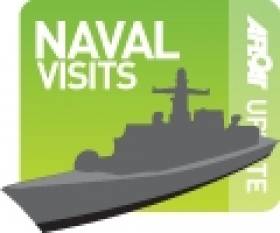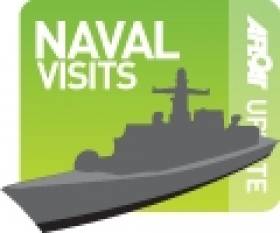Displaying items by tag: P2000 Archer Patrol Class
#navyVisitors – The P2000 ‘Archer' class fast inshore patrol boats from the UK Royal Navy that docked in Dublin Port yesterday, however berthed downriver and not as stated closer to the city centre, writes Jehan Ashmore.
HMS Dasher accompanied by HMS Express (each capable of 25 knots), arrived in the afternoon to moor abreast alongside the Poolbeg Yacht & Boat Club’s marina pontoon downriver in Ringsend.
The facility is close to the Tom Clarke toll-lift bridge that delineates where the working port lies to the east and the ‘Docklands’ quarter to the west where routine shipping ceased until the early 1990’s. The end of that era was marked by the Guinness tankers that loaded the 'black stuff' from Sir John Rogersons Quay.
It was during a visit yesterday overlooking the marina that the distinctive ‘Dragon’ representing the national symbol of Wales was observed on the funnel of HMS Express. The pair of inshore craft belong to 14 sisters commissioned originally for the Royal Navy Reserve (RNR).
There current role is in the First Patrol Boat Squadron. Among the Archer’s duties are fishery protection and safeguarding the integrity of the UK's territorial waters. In addition as training boats with a crew of 12, they also serve in the support role of the University Royal Naval Units (URNU).
HMS Express given her funnel provides a clue to her identity in that the craft is based at Penarth Marina in Cardiff Bay. The 54 displacement tonnes craft is affiliated with the Wales University Royal Navy Unit with undergraduates drawn from Cardiff and Swansea Universities, University of South Wales and University of Wales Institute Cardiff.
As for fleet companion, HMS Dasher, she is also based on the Bristol Channel as a training vessel for that city’s University through the URNU.
Both 20m craft provide the opportunity for students to spend time at sea, with weekends spent at sea and longer deployments during university breaks.
Beforehand of this call to Dublin, Afloat has identified that HMS Express (thanks to its pennent number of P163) had been a visitor to the Port of Barrow-in-Furness. On Sunday last the English north-west port on the Irish Sea celebrated a 150th anniversary and in the establishment of the Cumbrian town.
The event will be reported on Afloat and also to highlight further Irish-UK port shipping links as Barrow is where operator James Fisher Everard has its origins. They operate a fleet of tankers providing to the marine, oil and gas sectors.
Royal Navy Patrol Boats Return to Dun Laoghaire Marina Adding to Mix of Non-Leisure Craft
#NavalVisits – This weekend Dun Laoghaire Marina is host again to the same pair of Royal Navy 'Archer'-P2000 class training patrol boats that had called earlier this month, writes Jehan Ashmore.
As previously reported the Cardiff based pair HMS HMS Express (P163) and HMS Exploit (P167) with a crew of five each, are used to support the University Royal Naval Units (URNU). It transpires that on the last deployment, the pair did not reach Cork Harbour due to bad weather, however the boats called to Waterford instead.
Each of the 54 tonnes boats can carry university cadets where they train at weekends and during fortnightly deployment trips which can include trips to foreign shores.
The cadets perform a variety of tasks among them fire and flood exercises and navigational skills which also involves use of the flying bridge with its greater visibility.
Such a feature is also paramount particularly for SAR duties of the RNLI lifeboats, where two lifeboats of the service were berthed nearby of the P2000 craft. Also berthed in close proximity was the Irish Revenue Commissioners 23m cutter RCC Faire, a Finnish built 71 tonnes craft which transited Dalkey Sound last Friday.
In addition the largest vessel berthed in the 820-berth marina is the 26m excursion vessel St. Bridget, operated by Dublin Bay Cruises. The 100 passenger vessel is due to start a new service this month running between the harbour's East Pier and Howth Harbour.
Finally, moored alongside the inner berths closer to the shoreline were the research vessels RV Keary belonging to the Geological Survey of Ireland and fleetmate Cosantóir Bradán, which had served a career with Inland Fisheries Ireland.
University Challenge Heads for Cork
#NAVAL VISITS – Two small University Royal Naval Units (URNU) patrol training boats of the Royal Navy are due to call to Cork city centre along South Customs House Quay this afternoon, writes Jehan Ashmore.
The pair are HMS Exploit (P167) and HMS Express (P163) and they belong to a 14-strong P2000 Archer Fast Inshore Patrol Class. They form the First Patrol Boat Squadron and their primary role is to support the URNU but they also contribute to a wide range of fleet tasking.
Each vessel displaces 54 tonnes and has a crew of five on a boat that is just over 20m and draws a draft nearing 2m. Top speed is 22 knots and they can cover a range of 550 nautical miles.
HMS Exploit is the Birmingham University Royal Navy Unit's Training Patrol vessel, although the unit covers a wide area, taking undergraduates from eight Universities in the region. She was built by Vosper Thornycroft and commissioned in 1988. The boat is berthed in Penarth Marina, near Cardiff.
Likewise HMS Express is based at Penarth, she too provides sea training and offers an insight into the modern Royal Navy for Wales URNU undergraduates drawn from Cardiff, Swansea and Glamorgan Universities and University of Wales Institute Cardiff. Last year she took part in the Three Peaks Challenge.
The patrol boats follow last month's call also to the city of the Marine Protection Vessel (MPV) Jura which at 84m long makes her the largest of the three-strong Marine Compliance Scotland fleet. On that occasion she docked opposite at the North Customs House Quay.































































